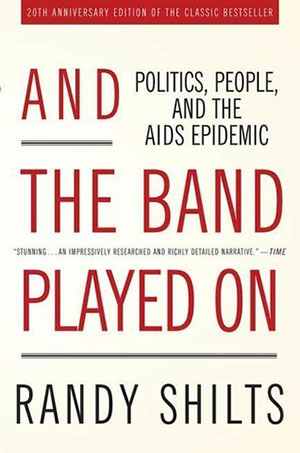 And the Band Played On: Politics, People, And the AIDS Epidemic by Randy Shilts
And the Band Played On: Politics, People, And the AIDS Epidemic by Randy Shilts Published by St. Martin's Press on January 1, 1987
Genres: Non-Fiction / History / United States / 20th Century
Pages: 629
Narrator: Victor Bevine
Length: 31 hours and 44 Minutes
Format: Audiobook
Source: Audible
Goodreads

By the time Rock Hudson's death in 1985 alerted all America to the danger of the AIDS epidemic, the disease had spread across the nation, killing thousands of people and emerging as the greatest health crisis of the 20th century. America faced a troubling question: What happened? How was this epidemic allowed to spread so far before it was taken seriously?
In answering these questions, Shilts weaves the disparate threads into a coherent story, pinning down every evasion and contradiction at the highest levels of the medical, political, and media establishments. Shilts shows that the epidemic spread wildly because the federal government put budget ahead of the nation's welfare; health authorities placed political expediency before the public health; and scientists were often more concerned with international prestige than saving lives.
Against this backdrop, Shilts tells the heroic stories of individuals in science and politics, public health and the gay community, who struggled to alert the nation to the enormity of the danger it faced. And the Band Played On is both a tribute to these heroic people and a stinging indictment of the institutions that failed the nation so badly.
As an added bonus, when you purchase our Audible Modern Vanguard production of Randy Shilts' book, you'll also receive an exclusive Jim Atlas interview. This interview – where James Atlas interviews Larry Kramer about the life and work of Randy Shilts – begins as soon as the audiobook ends.
Review
Randy Shilts wasn’t just writing about AIDS – he was living it. As America’s first full-time AIDS reporter, he watched friends die while politicians pretended nothing was wrong. His 1987 masterpiece, And the Band Played On, tells this story with the urgency of someone racing against time.
The book reads like a medical thriller, except every word is true. It starts in 1976 when a mysterious illness began picking off young gay men one by one. Nobody paid attention at first – these were the “wrong” kind of victims. By the time anyone bothered to look up, the virus had spread everywhere.
Shilts introduces us to the heroes and villains of the crisis. There’s Dr. Don Francis, the CDC scientist who kept hitting walls of bureaucracy. There’s a bitter rivalry between American and French researchers racing to identify the virus. And then there are the victims – countless young men watching their friends vanish while society shrugged.
What makes this story gut-wrenching isn’t just the death toll – it’s how preventable it all was. Shilts shows us how a deadly mix of prejudice, political cowardice, and institutional failure turned a manageable outbreak into an epidemic. Blood banks kept accepting infected donations. Politicians avoided saying “gay” in public. Even some gay organizations resisted closing bathhouses, worried about losing hard-won sexual freedoms.
The book isn’t perfect. Sometimes, it feels like trying to drink from a fire hose – there are enough characters and plot lines for ten books. But that’s kind of the point. The AIDS crisis wasn’t simple, and neither is this story.
Shilts died from AIDS in 1994, just a few years after publishing this book. He knew he was sick while writing it, which adds another layer of urgency to every page. He wasn’t just reporting history – he was fighting for his life and the lives of countless others.
Reading And the Band Played On today feels eerily familiar. Swap out a few details, and you might be reading about any modern health crisis. It shows how little has changed about human nature, institutional inertia, and the deadly cost of looking away from uncomfortable truths.